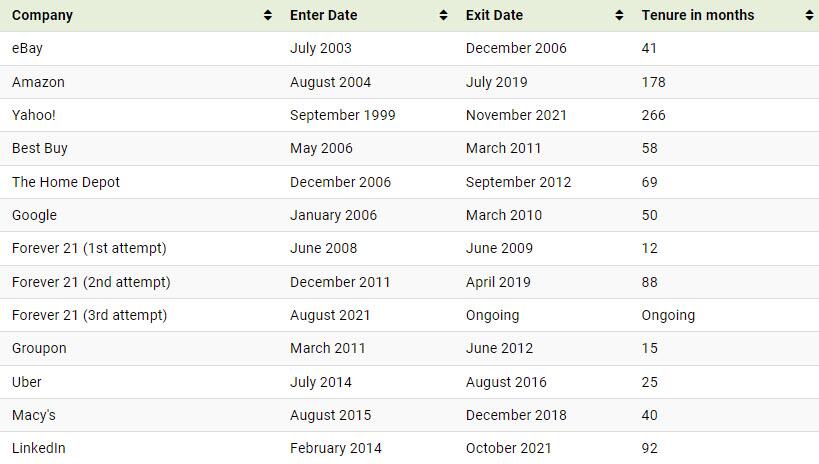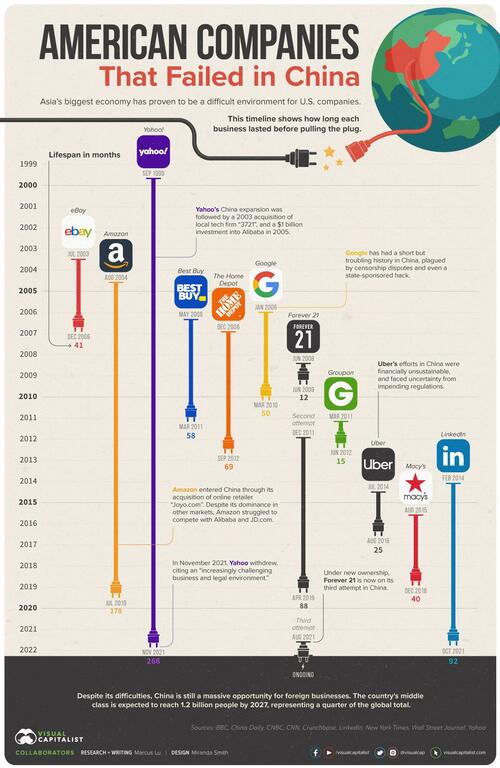American Companies That Failed In China
This is because the country’s middle class is simply enormous, growing from 3.1% to 50.8% of the country’s total population between the years 2000 and 2018.
According to Brookings, there are now at least 700 million people in China’s middle class, and this group has never had more disposable income to spend on consumer goods and services.
However, as Visual Capitalist's Marcus Lu details below, despite the size and potential of the market, China is not an easy place for foreign businesses to enter. As this infographic shows, many of America’s biggest names eventually admitted defeat.
Companies by Tenure
The following table lists the tenures of every company included in the graphic.
It’s worth noting that Google’s parent company, Alphabet, still maintains a physical presence in China. Google’s services were banned by the Chinese government in 2010.

Dates were gathered from various media reports and sources. There may be small deviations from when a company actually entered or exited.
The reasons for why these companies withdrew are surprisingly similar and can be broken down into two broad categories.
Retailers Fail to Adapt
Failing to adapt to the cultural differences of Chinese consumers is a common mistake. Here’s how two American retailers learned this lesson the hard way.
Best Buy
Best Buy struggled because Chinese consumers were not willing to pay a premium for brand-name electronics. Local retailers could often source similar (or counterfeit) goods for much cheaper, and undercut Best Buy’s prices.
“Why buy a Sony DVD player or Nokia phone at Best Buy when you can pay less for the exact same product at a local store?”
– SHAUN REIN, CHINA MARKET RESEARCH GROUP
Best Buy also made the mistake of bringing over its large flagship stores, which were out of reach for most consumers. Due to severe traffic congestion, locals preferred smaller shops that were closer to home.
Home Depot
The Home Depot expanded into China around the same time as Best Buy, but unfortunately, it was another cultural mismatch.
Home Depot failed to acknowledge that “do it yourself” repairs are not a strong cultural match for China. Labor costs are relatively low, so rather than do the work themselves, many homeowners prefer to rather hire someone else to do it. On the other side of the equation, the American brand failed to win over contractors doing the repairs and renovations.
The Home Depot’s product offerings were also left unchanged from America, making them a poor match for local tastes. As a point of comparison, IKEA has had a presence in China since 1998 and continues to open new stores to this day.
Tech Firms Clash with Regulators
Uber’s experiences in China make a good case study on how American tech firms struggle to succeed in Asia’s biggest economy.
For starters, breaking into the Chinese market was incredibly expensive. Uber spent billions on subsidies to attract customers and drivers, and losses were quickly piling up. To make matters worse, domestic rivals like DiDi were also handing out subsidies.
On the operational side, Uber ran into several hurdles. To avoid issues with China’s data localization laws, the company needed servers on Chinese soil. Its navigation provider, Google Maps, also had limited accuracy in the country. This left Uber with no choice but to partner with Baidu, a Chinese tech company.
The final straw, however, was likely a set of impending regulations which targeted the ride-hailing industry. Under these rules, Uber risked losing control of its data and would need both provincial and national regulatory approvals for its activities. Even further, subsidies would also no longer be allowed.
Uber realized that doing business in China was unsustainable, but its exit wasn’t exactly a failure. In 2016, Uber sold its assets to rival DiDi and took an 18.8% stake in the company. Ironically, DiDi is now embroiled in a conflict with Chinese regulators over its listing on the NYSE.
The Tech Fallout Continues
Since Uber’s departure, the Chinese government has increased its grip on the tech industry. This has driven more American firms out of the country, including Yahoo and LinkedIn, which are now owned by Microsoft.
Both firms announced their withdrawals in 2021 and were rather clear about why they made the decision. Yahoo cited its commitment to a “free and open” internet, while LinkedIn says its decision was due to a “considerably more difficult operating environment and higher regulatory requirements”.
Given the geopolitical tensions between the U.S. and China, companies that generate data (often seen as a national security concern) are likely to continue facing regulatory hurdles.
Outside of tech, China is still a massive opportunity for American businesses. By 2027, the country’s middle class is expected to reach 1.2 billion people, or one-quarter of the global total.
Disclaimer: Copyright ©2009-2022 ZeroHedge.com/ABC Media, LTD; All Rights Reserved. Zero Hedge is intended for Mature Audiences. Familiarize yourself with our legal and use policies ...
more



